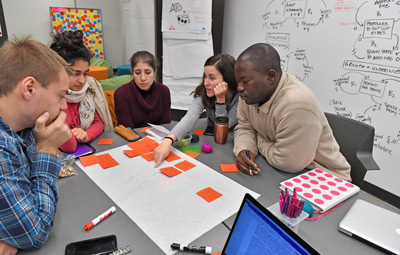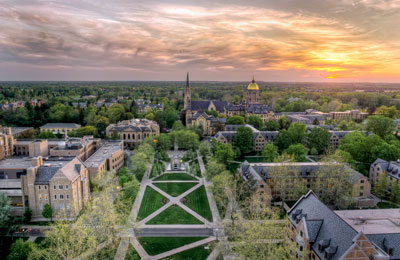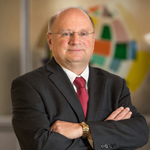2018 Graduate Education | International Affairs
THIS GUIDE IS NO LONGER ACTIVE. For the current FP Guide, click here.
University of Notre Dame,
Keough School of Global Affairs
“We need to reimagine what globalism means,” says R. Scott Appleby, Marilyn Keough dean of the Keough School of Global Affairs at the University of Notre Dame.
“Despite current trends, the future is global,” he says. “The challenge is to get globalism right—to address the widening gap between those who have risen as a result of globalism and those who have been left behind.”
 Appleby calls for “globalism 2.0”: “We need to make globalism effective for a much broader population and address the needs of victims of war, people displaced by climate change, the unemployed, and more.”
Appleby calls for “globalism 2.0”: “We need to make globalism effective for a much broader population and address the needs of victims of war, people displaced by climate change, the unemployed, and more.”
The Keough School has just completed its first year, but it shares in a long tradition of humanitarian engagement as part of the University of Notre Dame.
“We want to be known for focusing on the poor, the marginalized, and the dispossessed,” says Appleby. In addition to needs around the world, the global reach of that focus includes displaced workers in America’s heartland.
The Keough School’s two-year Master of Global Affairs program takes an integrated approach to human development, encompassing culture, religion, and community in addition to economics.
“We want our students to be comfortable navigating different cultures,” says Appleby. “Effective development requires not only economic and technological solutions, but also good governance, peacebuilding, human rights advocacy, and cultural competency.” In addition to acquiring analytical and other practical skills, students take a deep dive into a culture and also explore a global issue in depth.
 The school incorporates the study of religion in global affairs through its new Ansari Institute for Global Engagement with Religion. As a center for public deliberation and education about different religions, the institute facilitates the study of roles that religions play in health care, peacebuilding, and more. It also plans to offer graduate fellowships and organize conferences featuring leading practitioners and thinkers engaged in secular and inter-religious dialogue on issues of pressing social concern.
The school incorporates the study of religion in global affairs through its new Ansari Institute for Global Engagement with Religion. As a center for public deliberation and education about different religions, the institute facilitates the study of roles that religions play in health care, peacebuilding, and more. It also plans to offer graduate fellowships and organize conferences featuring leading practitioners and thinkers engaged in secular and inter-religious dialogue on issues of pressing social concern.
“The various roles of religions in alleviating suffering, accompanying the migrant and the refugee, serving the poor, and reducing violent conflict are far less understood and publicized than the havoc created by a tiny minority of deluded religious extremists on every continent,” says Appleby. “The Ansari Institute directs attention to the vast good done by religions and the even greater good they might accomplish in partnership with universities and other institutions.”

“We want our students to be comfortable navigating different cultures.” –R. Scott Appleby, Marilyn Keough Dean, Keough School of Global Affairs, University of Notre Dame
Another distinctive feature of the Keough School is its Integration Lab (i-Lab), through which students work with global partners, faculty mentors, and fellow students across different disciplines to address real-world issues. This summer, the i-Lab is sending teams of Master of Global Affairs students to 13 countries to research and help address a range of global challenges by working with seasoned professionals from partner organizations. For example, students in one group are visiting Greece, Germany, and the U.S.–Mexico border to explore and document best practices for respecting the human rights of migrants. They are working in partnership with the U.S. Conference of Catholic Bishops, Migration and Refugee Services.
In addition, the Keough School’s Global Policy Initiative (GPI) offers a weekly Global Policy Seminar, which brings to campus influential policymakers and leaders, such as retired Lt. Gen. James Clapper, former U.S. director of national intelligence; Laura Alfaro, Harvard Business School professor and former minister of national planning and economic policy for Costa Rica; and Denis McDonough, former White House chief of staff.
GPI also maintains a Washington, D.C., office that serves as a key resource for students interested in policy-related internships and careers.
Graduate Degree Program in International Affairs:
• Master of Global Affairs
Contents
- 2018 Graduate Education | International Affairs
- Johns Hopkins University, School of Advanced International Studies (SAIS)
- UC San Diego, School of Global Policy and Strategy (GPS)
- NYU School of Professional Studies, Center for Global Affairs
- University of Notre Dame, Keough School of Global Affairs
- Georgetown University, Walsh School of Foreign Service (SFS)
- SOAS University of London
- Yale University, Jackson Institute for Global Affairs
- University of Kent, Brussels School of International Studies (BSIS)
- Seton Hall University, School of Diplomacy and International Relations
- The Fletcher School of Law and Diplomacy at Tufts University
- University of Denver, Josef Korbel School of International Studies
- Arizona State University, Center on the Future of War